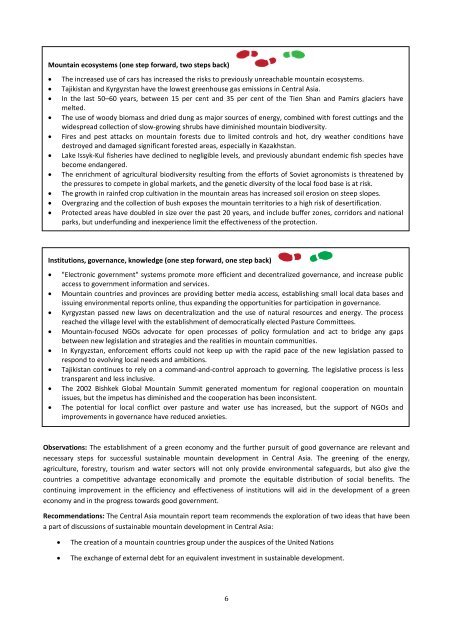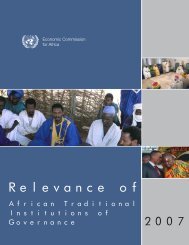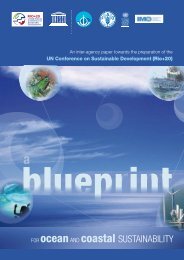Download - Rio+20
Download - Rio+20
Download - Rio+20
Create successful ePaper yourself
Turn your PDF publications into a flip-book with our unique Google optimized e-Paper software.
Mountain ecosystems (one step forward, two steps back)<br />
• The increased use of cars has increased the risks to previously unreachable mountain ecosystems.<br />
• Tajikistan and Kyrgyzstan have the lowest greenhouse gas emissions in Central Asia.<br />
• In the last 50–60 years, between 15 per cent and 35 per cent of the Tien Shan and Pamirs glaciers have<br />
melted.<br />
• The use of woody biomass and dried dung as major sources of energy, combined with forest cuttings and the<br />
widespread collection of slow-growing shrubs have diminished mountain biodiversity.<br />
• Fires and pest attacks on mountain forests due to limited controls and hot, dry weather conditions have<br />
destroyed and damaged significant forested areas, especially in Kazakhstan.<br />
• Lake Issyk-Kul fisheries have declined to negligible levels, and previously abundant endemic fish species have<br />
become endangered.<br />
• The enrichment of agricultural biodiversity resulting from the efforts of Soviet agronomists is threatened by<br />
the pressures to compete in global markets, and the genetic diversity of the local food base is at risk.<br />
• The growth in rainfed crop cultivation in the mountain areas has increased soil erosion on steep slopes.<br />
• Overgrazing and the collection of bush exposes the mountain territories to a high risk of desertification.<br />
• Protected areas have doubled in size over the past 20 years, and include buffer zones, corridors and national<br />
parks, but underfunding and inexperience limit the effectiveness of the protection.<br />
Institutions, governance, knowledge (one step forward, one step back)<br />
• "Electronic government" systems promote more efficient and decentralized governance, and increase public<br />
access to government information and services.<br />
• Mountain countries and provinces are providing better media access, establishing small local data bases and<br />
issuing environmental reports online, thus expanding the opportunities for participation in governance.<br />
• Kyrgyzstan passed new laws on decentralization and the use of natural resources and energy. The process<br />
reached the village level with the establishment of democratically elected Pasture Committees.<br />
• Mountain-focused NGOs advocate for open processes of policy formulation and act to bridge any gaps<br />
between new legislation and strategies and the realities in mountain communities.<br />
• In Kyrgyzstan, enforcement efforts could not keep up with the rapid pace of the new legislation passed to<br />
respond to evolving local needs and ambitions.<br />
• Tajikistan continues to rely on a command-and-control approach to governing. The legislative process is less<br />
transparent and less inclusive.<br />
• The 2002 Bishkek Global Mountain Summit generated momentum for regional cooperation on mountain<br />
issues, but the impetus has diminished and the cooperation has been inconsistent.<br />
• The potential for local conflict over pasture and water use has increased, but the support of NGOs and<br />
improvements in governance have reduced anxieties.<br />
Observations: The establishment of a green economy and the further pursuit of good governance are relevant and<br />
necessary steps for successful sustainable mountain development in Central Asia. The greening of the energy,<br />
agriculture, forestry, tourism and water sectors will not only provide environmental safeguards, but also give the<br />
countries a competitive advantage economically and promote the equitable distribution of social benefits. The<br />
continuing improvement in the efficiency and effectiveness of institutions will aid in the development of a green<br />
economy and in the progress towards good government.<br />
Recommendations: The Central Asia mountain report team recommends the exploration of two ideas that have been<br />
a part of discussions of sustainable mountain development in Central Asia:<br />
• The creation of a mountain countries group under the auspices of the United Nations<br />
• The exchange of external debt for an equivalent investment in sustainable development.<br />
6
















